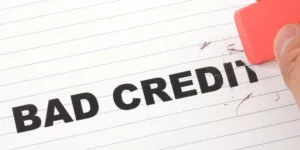Your credit score plays a major role in your financial freedom. It dictates whether or not you can purchase a home, take out student loans, or buy a new car. Unfortunately, bad credit can also prevent you from pursuing your dream of opening a business—if you don’t know how to get around it.
It’s not impossible to start a business with bad credit, but you should be aware of the way it affects your repayment credibility. Banks only offer loans when they’re confident the borrower will pay it back. A bad credit score makes you a less credible loan candidate, so you may have to pursue different opportunities to fund your business.
Good credit scores (700 or better) will get you low interest rates. A low credit score (less than 680) means that you’re more likely to have higher interest rates and fees. That’s a risk you’ll have to take, however, if you want to start a business.
With these risks in mind, it’s important to look at alternative options for getting the funding you need. Here are some things you can try:
1. First, try to repair your credit
To reduce your risk when starting a business, you should aim to repair your credit. You won’t be able to turn your score around overnight, but you can take steps to begin improving it so the bank knows you’re serious.
The fastest credit repair steps include negotiating with your creditors, paying down revolving accounts, managing accounts and credit limits, and improving your debt to income ratio. As you show a pattern of positively working with your debt, banks are more likely to offer a loan, even if your score doesn’t rise immediately.
2. Try nonprofits and microlenders
When your credit score is low, banks often aren’t the best option. Microlenders and nonprofit groups are often better for getting the necessary startup funding.
As explained previously, those with low credit often have the most expensive loans, but microlenders and nonprofits operate a little differently. These groups are designed to help those with disadvantaged backgrounds start their own businesses.
3. Seek alternative, low-risk funding in unusual places
There are other lenders who offer low-risk funding as well. Web-based lenders, for example, are often less worried about your credit history. You can find a series of web-based lenders who offer loans specifically for your credit score. They’ll also report your payments to the credit bureaus so that you can work on raising your score while building your business.
There are also gifts and grants that can help you get started with little to no commitment. The government, in an effort to help improve the economy and support American companies, has a series of private grants to aid business startups. Finding these grants isn’t easy, and you’ll have to go through some qualification steps, but with research and appeals, most people can find free money or subsidized loans that will help to start their business.
4. Look into loans based on business revenue
If you have a poor credit score, it’s likely that you’re also strapped for cash, which would make loan repayment difficult. A revenue-based loan can be a great happy medium for your situation. It’s a loan like any other, but the repayment periods are more flexible. It’s based on business profits, so if you make $1,000 one month and $10,000 another month, you can pay less or more according to what you made.
Firms for revenue-based financing tend to work a little more closely with you than bank lenders, which provides the flexibility necessary to make payments and improve your credit score, despite a bad credit rap.
The risk is a little higher than a conventional business loan, since you could pay as much as 2.5 times the principal loan amount, but it’s better than not being able to pay for your business at all.
Having bad credit doesn’t mean you can’t pursue your dreams of owning a business. There are many financial options in an entrepreneur’s toolbox that don’t involve risking personal assets or a part of your business to get started. With a little research and a willingness to improve your personal credit score, you can get your business off the ground and on the path to success.








